#the past relative to the other shrine from the world where the flame went out w darkness ruling.
Explore tagged Tumblr posts
Text
fictional or not, dragon lore is always so interesting.
#I'm watching a DS3 lore video on the nameless king bc i wanted to figure out wtf is the dragonslayer armor's deal#but the greater lore around the dragons is SO fucking good and now I'm thinking about dragons lol#i could watch these dark souls/elden ring lore videos by VaatiVidya all day tbh#i LOVE how deep he goes with it. these worlds and their lore already feel huge but#as someone who's only played the third dark souls it rly makes me appreciate how complex and interconnected it is as a series.#sometimes i wonder if the creators ever watch these vids and think “we didn't mean all that but that's a great idea”#or if they watch it and get super happy like YES that is exactly what our subtle storytelling meant.#either way i have So so much respect for ppl who go and put together these lore videos#going as far as to look at game dumps and early releases/cut content and ALL the dialogue and item descriptions#for any one topic the lore is so scattered about and piecing together any single thing seems like such a massive undertaking.#like lmaooo i can't even follow a single questline without pulling up the wiki#a recent rabbit hole i went down too is how there are different times/realities even just DS3 takes place in?#like how in Untended Graves you see a world without light where darkness rules - and in ringed city when ur fighting those#dragons in the base of that big tree that's supposed to be the original firelink shrine and then the shrine u use is maybe The Past?#the past relative to the other shrine from the world where the flame went out w darkness ruling.#idk how the transition works from being in that one dude's garden in ur world to just walking right into the other one but idc.#just say i got twilight zoned or somethn lol. always. very interesting stuff :^} I'm not smart enough to pick up on anything in the moment#but it's SO fun watching what other people pieced together whose whole thing is that they go thru these games thoroughly.#and in a way it makes me not want to stop playing DS/ER bc there's just so much going on here that's so rewarding??#like. on TOP of the suuper deep lore the gameplay is also just super fun and u get HELLA weapons and special moves#and the modding scene has made some hella streamline tools that are so good these have been the first games I've ever MADE mods for!#like i can't think of any other games that are like this where I'm really encouraged it make it my own with such a helpful and#engaging community. I'm sure there r other games out there that are similarly engaging with deep lore and streamlined modtools#and mod communities but (〒﹏〒) 1. where?? 2. DS/ER are very beloved to me.#it's funny how little u have to know or do to beat their respective storylines. I've played them both a ton and still know so little.#and when i walk away from these lore vids I'm always like Woah 😵💫 yk? anyways.. that's my lil rant :3 back to work now
3 notes
·
View notes
Text
The Trio, but what if they were young Gods?
Honestly, these are my own personal headcanons ever since I watched a bit of Okami’s boss battles, but I definitely welcome other ideas on what sorta gods y’all would see them like.
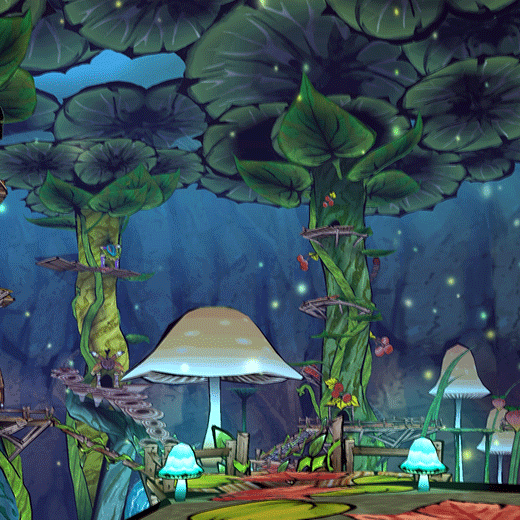
I was primarily inspired by in game artworks such as these:
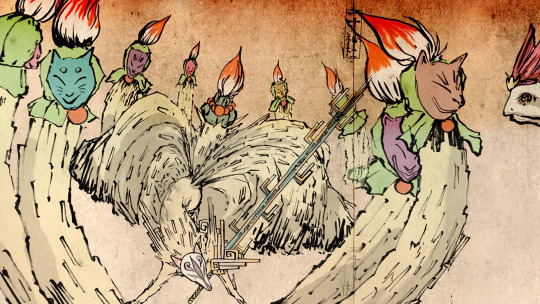
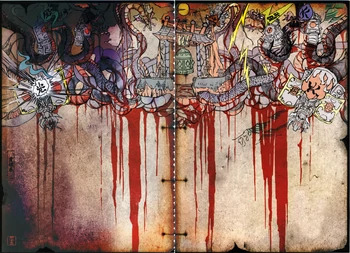
And I wondered,
“Hmm. How would people see the trio if they were feared/revered Gods? What kind of deities would they be?”
DISCLAIMER:
In this list, all three of them had died as mortals.

Genos is a vengeful fire god, whose flames have burned and purified great evils that had come to torment the populace, and just as often, have found themselves extinguished at the hands of a greater threat. Everyday it gets harder to do so, with the deity’s power exploding in growth and size due to his diligence.
His mortal body isn’t one of flesh or blood. Not anymore. Instead, his avatar is created from a mass of metal and burning coal as his fuel, furnaces smoldering inside his body. Magic engravings are carved into the metal, acting as his blood and bones, twining the inorganic materials together just as they would for veins and nerves in a human.
A lone old man is one of his most dutiful attendants, and is his first follower. When the young god departs the mortal world to return to the celestial plane, he repairs his broken avatar, or creates a new one with different metals and engravings to house more of the young God’s power in his fights against the demons that plague the world. Too often has his own flames, or sheer recklessness, had been the cause of his own defeats in battles.
Kuseno should know. He’s seen it far too many times when he was still a mere boy. These same markings and metals were the ones that were tattooed on and built into his burnt and distorted skin; they had saved his life and blessed him with magic.
But they weren’t enough to protect him from death when the boy had found himself getting swarmed by demons.
All that was left of him was patches of blond hair, blood splattered all over the scorched open field where he fought, and bits of tattooed skin found beside deformed and clawed metal that had long grown cold when he found him at daybreak.
For his follower, the one that had acted as a father figure to him when he was still mortal, Genos makes sure that he will always come home to a place filled with warmth and good food, no matter the season, taking care to protect his crops from overheat or fires. He’s not known for his blessings, but for the people that he loves, he won’t hesitate to cultivate their quality for their loyalty.
He isn’t a cruel god, but he isn’t a forgiving one either. For those whom have wronged him, he makes their crops die, their residences swelter, their precious metals too hot to touch, much less trade: even with the best rubber gloves.
This is his mercy in the face of their blasphemy. If they refuse to seek forgiveness from one of his shrines or messengers, Genos will burn down the protections they use on their most valuable items and gifts, cursing them to never again be used by their hands, nor by the hands of anyone they conscript or affiliate with. His fire is too damning to be stopped by insulators of the finest quality, too persistent to be stopped by barriers of any kind.
Never again will their treasures be theirs to hold, and even Genos’ messengers cannot be entreated to remove it themselves: they must call upon his name and presence if they wished to dispel it.
The cursed ones who insist on using them will find their fingers burned, the items eventually melting and burning down into nothing.
For this, he’s often a god of good fortune for the unfortunate and desperate, for the displaced victims whose homes have been destroyed. Many people praise him for his blessings, and just as many curse and fear him for the damage he can cause to their lives.
Farmers who’ve kept a good record in respecting him will see that their crops never overheat or burn, and wouldn’t drown from merciless rains. When winter comes, they will not freeze, and neither will them and their families.
Merchants and rich lords are careful not to offend him, while the poor and unremarkable make small, heartfelt blessings when he punishes acts of cruelty made by authority figures abusing their power.

For some reason, a wandering bald ronin finds himself in the favor of this God, so much so that his acquaintances balk at the sight of all the blessings heaped upon him. Others joke about how an unremarkable man such as himself had a divine being worshipping him.
He mostly remains oblivious to this, until winter rolls around. His stay at a shabby inn remains uneventful and freezing, until a blond stranger greets him at his door and asks to be let in, eyeing Saitama with an intensity that he’s unused to seeing.
He attributes the sudden burning warmth in his face as body as embarrassment. He’s not used to this much attention being directed to him after all. Introverted as he was, he didn’t hear the other residents softly exclaiming at how warm their rooms became, nor did he notice them staring wide eyed at his new disciple, knowing exactly what his presence meant.
—
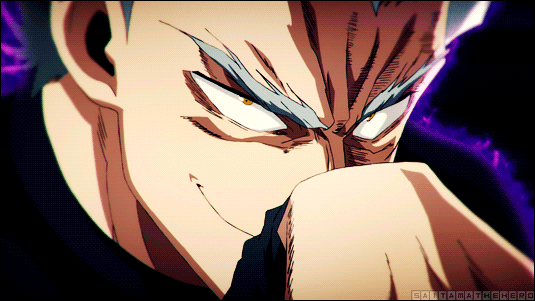
Garou is a fearless and awe-inspiring air god that takes great delight in being a spirited competitor and a trickster, pushing his mind and body to the limits of what he can do: both as a celestial and as a mortal. Man, beast, or demon, Garou had taken many forms to combat and play clever tricks on others, constantly experimenting and learning new ways to become a more formidable threat to his enemies, and an incredible ally to those who’ve won his genuine care.
He’s more active during the night. Demons and monsters are plentiful under a starless sky, and the quieter nights has him travelling the lands in relative peace: unless he decides he’s bored and finds something, or someone, to play tricks on.
He inspires plenty of respect, awe, and even humor for his exploits. His sense of justice however, is notably somewhat distorted in the eyes of the public. Scholars have written about his achievements and debated at length at how he came to be, who he truly is, for how easy it is to misinterpret or misunderstand his character when writing plays featuring the deity. He’s an attractive and rightfully arrogant man, so it becomes all too easy to paint him in a better or worse light depending on the writer.
Illusions, tricks, impressive physical, magical, and mental prowess, as well as being notoriously devoted to himself, his beliefs, and the select few he deems to be good, it’s not guaranteed that he’ll work with, or against you. He’s a force of chaos with his own code, for better or for worse.
His former master, an older and wiser god, had taught him how to fight from what he had learned from the flow of water- from the steady stream of a river to the thunderous force of ocean waves crashing against a jagged cliff face. Garou had repaid the lessons with sewing discord in the mortal world with his misguided ambitions, using his lessons to learn how to harness the wind to do his bidding, away from Silverfang’s techniques.
Lessons from other age old masters and their followers has him learning every style of every kind, magical and martial art alike, never paying attention to the philosophies surrounding each one out of disinterest.
His insolence had casted him out from the rank and file of the celestials, and he wanders the mortal plane as a demigod in search of a challenge and purpose after Saitama stops his naïve onslaught against the world.
In another life, maybe he would’ve had a more merciful upbringing as a child. But his mortal life was cut short: how? He can’t remember.
Maybe it was his tormenters at school.
Was he cursed? Were they just cruel?
Maybe it was a stormy night on a treacherous mountain when he tried to journey to a far off dojo for strength, away from what little he can remember from home.
Did he slip and fall to his death?
Maybe he had an unlucky encounter with a demon or two.
Or three. Or ten. Maybe they swarmed, razed, and devoured his village.
All he can remember was that his past life was filled with cruelty, where the world worked against him. When he awoke at the steps leading upwards to a dojo that gleamed an unearthly gold, the ground being amassed of clouds that didn’t touch his skin, and the skies jet black with stars shining like faraway lanterns, the boy-spirit didn’t hesitate on climbing the steps.
Storms and violent winds are heralds for the oncoming chaos he brings to the lands he wishes havoc on: the young god can be as theatric as he is destructive. He may have expressed the desire to become one with the demons, but his acts against humans are significantly less lethal than the ones he commits against demons, more mischief and punishment than cruelty.
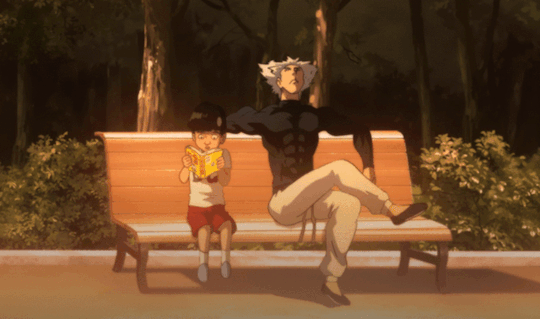
A young boy had saved him when he took on the form of a wolf. Call it bad luck, or underestimating the threat, but Garou had been hunted to near death by man and monster alike.
Tareo stumbled across his unconscious, bleeding wolf form and took him as close to his home as he dared, housing him in an abandoned den safe from the weather’s damage. From there, he travelled to and from his house as days went by, patching him up as best he can while talking about his life and what today had been like, somehow oblivious to the danger that comes with caring for a wild beast, who’s staring at the kid incredulously, knowing this very fact.
In time after the wolf had disappeared from the den, leaving him dispirited and lonely for some time, he becomes acquainted with a ‘Mister’ who frequents the town he lives in, who teaches him how to defend himself against his bullies.
And in the dark hours of the night, when he ventures too far into the more dangerous parts of the village when his ‘friends’ forced him to, an eerie howling can be heard over the wind. They flee not long after when they see and hear the illusions that Garou had conjured in the dark thickets of the forest.
Tareo learns to associate the cold winds with danger. He may be in awe of gods and folk heroes, but he finds himself wondering who he managed to win the favor of to justify divine intervention. Just how often do cold winds press so insistently against him when he goes to dangerous alleys and areas?
Maybe Mister will know. He’ll ask him about it sometime.
—
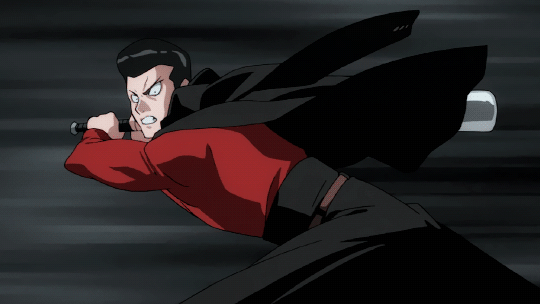
Badd is a formidable and intimidating thunder god, whose displays of power have kept enemies in fear of committing cruel acts, lest they find themselves lost in a violent thunderstorm, their meager attempts to return home making them look like lost pieces of cloth getting battered around by the wind as the sound of thunder grows louder in the distance.
A cruel mortal will find themselves nearly dying from a tree almost crushing them on a dark night, with only Badd’s occasional flashes of lightning acting as their sole warnings for their brush with death, searing the experiences into their minds, prompting them to avoid the more vile crimes out of fear. Demons will find themselves stricken right where they stand, instantly killed on the spot.
If his followers have strayed to the dark arts in his name, Badd will angrily strike his condemnations on a surface that can withstand his thunder. If they forget, he strikes down his commandments instead, the words white-hot and glowing from his divine power.
Despite his brash and fearsome demeanor, he is the kindest out of the three, the most paternal figure in the trio. Many families dedicate their offerings to him; in return, he makes sure that they are safe from danger, and that their children aren’t stolen away by demons in the night.
He takes a shine to earnest folk. Good, hardworking people will be safer when travelling into more dangerous situations. There are plenty of books written on the patterns of thunder and lightning he sends down, and what kind of omens they are to prepare accordingly.
Most of it is psuedo-science. Badd may not be the most cunning god, but he knows that enemies can learn different patterns and work against him.

Zenko had cried with a grief she had never known when he was killed trying to protect her and their home as a young Ronin. Growing up, the pain dulled, and she took up the mantle he had chosen to take, teaching her students on how to protect their village just as he did, travelling the land to spread Badd’s name.
She knows exactly who her brother is now, and acts as his messenger and regent for his followers. It’s been years and she’s grown up, while he’s a busy god defending the other side of the planet from dangerous threats, so their meetings are few and far in between.
But every now and again, they cross paths and reunite; he always cries and she always comforts him, sighing with equal amounts of affection and exasperation at how sentimental he always gets. Every time they meet, he thanks her for all the offerings she’s made to him, all the devoted followers she’s inspired to carry out his name and commandments. Every time they meet, she hugs her brother as tight as she can and swears his heartbeat now sound as loud as the thunderstrikes he summons on his enemies, the static crackling on the clothes at his newfound power, but he’s still the same big brother that raised her as best he could when she was little.
Zenko misses Badd everyday when they have to go their separate ways, and know he’ll be left devastated when she lives and dies a mortal life, but they treasure what time they have when they manage to reunite.
All Three
Due to their ferocity and fearlessness, many, many warriors pray to them for power and success. They’re far more popular in young fighters seeking to make something out of themselves, just as old gods are more popular with veterans and experienced warriors. Revitalizing food are often offered to them, with the occasional sweet cakes dedicated to Badd. Trophies of their successes (such as a horn from a slain demon, some scales from a malevolent dragon) are offered to shrines for safekeeping after they’ve prayed to them successfully.
All three have soft spots for children and the victimized, and such, many family offerings and whatever could be spared from folks who have little to offer are often found at their shrines.
They strike a sense of home for the ones who don’t truly fit in. Badd was not well mannered or refined, Garou was mischievous and disillusioned with the world, and Genos had everything he’d known and loved torn away from him when he was young. All three aren’t the best at socializing, are intimidating in their own rights, and are known to be aggressive at times.
For them, they don’t leave much, except for heartfelt prayers and confessions they’d never dare to tell others. The three fulfill it as best they can: in person if they have to, though they are careful to use a slightly different form each time. Who knows what could happen if people started recognizing you when you take on a mortal form?
34 notes
·
View notes